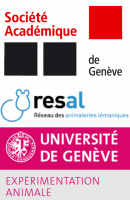
Responsible animal research, reporting and publishing
28.04.2025 09:00 – 12:30
Data generated using animals have a special value because of the ethical implication of using animals in research. This conference will address how the principles of ethical animal research apply not only to experimental procedures, but also to experimental design and reporting.
Pending application for accreditation as continuing education in animal research (0.5 day).
Mandatory registration to get a certifcate of attendance, otherwise no need to register: https://resal.unil.ch/
Chairs: Dr Julie Vérièpe and Dr Frédéric Schütz
9:00-9:15
New veterinary ordinances: what does it change?
Dr Elsa Giobellina, Animal Welfare Officer, University of Geneva
What has changed in veterinary ordinances in force since 1 February 2025? What are the implications of the new articles for the breeding of experimental animals? This presentation will give the audience the opportunity to familiarize themselves with this new legal framework on animal research.
9:15-9:45
Breeding optimization: animal facilities can help you!
Dr Jean-Luc Pitetti, CMU animal facility, University of Geneva
The CMU animal facility will set up a service to support research teams in planning efficiently the breeding of experimental animals. This presentation will draw the attention of the audience to the new authorization form, which will require a detailed description of the breeding plan from January 2027 on.
9:45-10:30
Spread the word: when reporting your research, it is the little things that can make the biggest difference!
Dr Nikki Osborne, RESPONSIBLE RESEARCH, UK
Dr Osborne is the founder and director of the Responsible Research company in the UK, which aim “to transform individuals' abilities to review, plan, design, conduct, analyse and communicate research responsibly to benefit both science and society”. Dr. Osborne has also a solid scientific background, as well as in edition. She will share information on animal research reporting to support researchers to meet editor expectations.
10:30-10:50 Coffee break
10:50-11:30
Weight loss in preclinical models of sepsis: lessons from 10 years of follow-up
Prof. Thierry Roger, University of Lausanne
Prof. Roger is head of the laboratory of the Infectious Diseases Department of the CHUV. In 2024, he published a retrospective study on the monitoring of laboratory animals based on experiments conducted over 10 years (See “Using weight loss to predict outcome and define a humane endpoint in preclinical sepsis studies”, Brochut et al., Scientific Report, 2024). Beyond the interest in the field of infectious diseases, this rigorous approach is of general interest as the analysis of historical data makes it possible to improve the monitoring of animals and identify the most appropriate parameters to record.
11:30-12:30
Research data management at the University of Geneva: Plan, Collect, Organize, Store, Preserve & Share
ResearchData team, University of Geneva
What are the best practices for publishing, managing, curating and store experimental data? How do these principles apply to animal research? The team of the ResearchData division of the University of Geneva will address these questions.
Lieu
Bâtiment: CMU
Auditoire Alex F. Müller
Centre Médical Universitaire (CMU)
1, rue Michel Servet
1211 Genève 4
Organisé par
Expérimentation animaleIntervenant-e-s
Elsa Giobellina, Aniaml Welfare Officer, University of GenevaJean-Luc Pitetti, Scientific collaborator, Animal facility of the Faculty of medecine, University of Geneva
Nikki Osborne, Founder at RESPONSIBLE RESEARCH, UK
Thierry Roger, Professor at the University of Lausanne and head of the infectious disease department at CHUV
ResearchData team, Data Stewardship plan of the University of Geneva
Julie Vérièpe, Chair, University of Geneva
Frédéric Schütz, Chair, University of Lausanne
entrée libre
Inscription
Date limite d'inscription: 27.04.2025
Please register before the event at https://resal.unil.ch/

 haut
haut